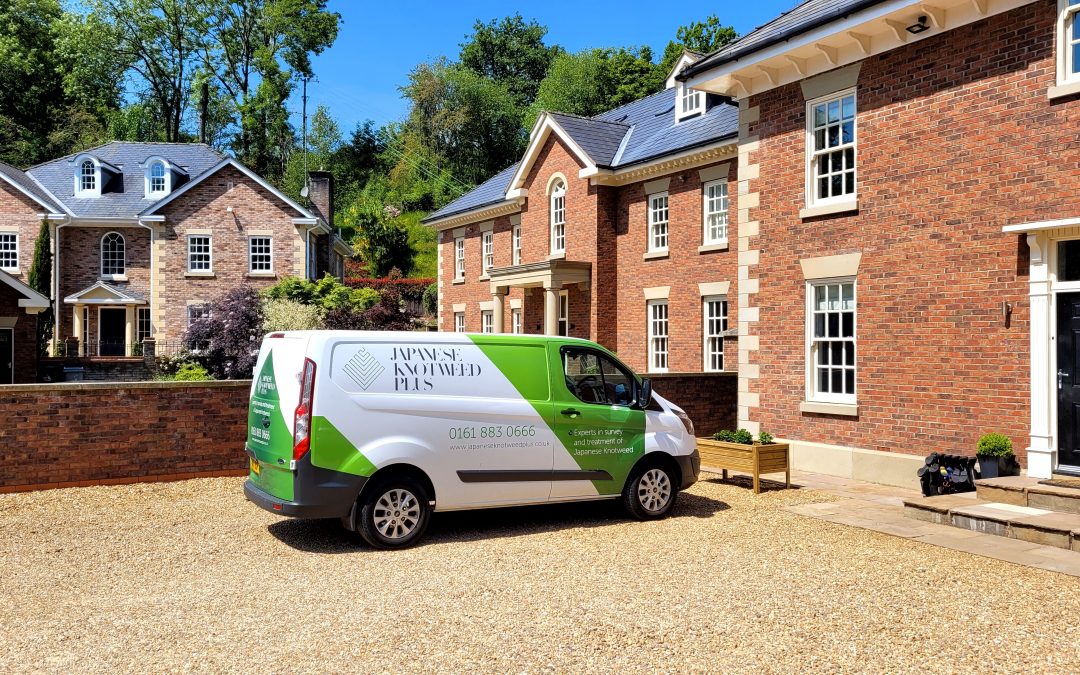How do I know if I have knotweed?
Here are some features to help you identify Japanese knotweed:
- Leaves: Japanese knotweed leaves are heart- or shovel-shaped, typically between 5-15 cm in length. They are a vibrant green colour and grow in a zig-zag pattern along the stem.
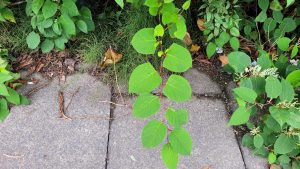
How do I know if I have knotweed?
- Stem: The plant’s stems are hollow, bamboo-like, and have nodes or ‘knots’ at regular intervals. They are typically green with red or purple speckles and can reach heights of 2-3 meters (about 7-10 feet) in the growing season.
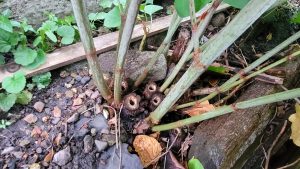
How do I know if I have knotweed?
- Flowers: Small, creamy white flowers will appear in late summer (around August to September), arranged in spike-like clusters around 10-15cm long.
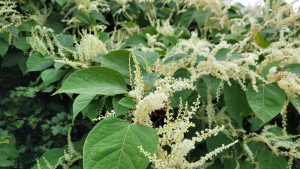
How do I know if I have knotweed?
- Rhizomes: The underground parts of the plant, called rhizomes, are thick and woody with a bright orange or yellow interior. They are very tough and can spread extensively, which contributes to the plant’s invasiveness.
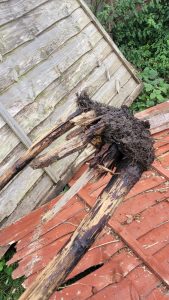
How do I know if I have knotweed?
- Growth Rate: Japanese knotweed grows rapidly, often around 10 cm a day in the growing season.
- Winter Appearance: In the winter, the plant dies back to ground level. However, the remains of the previous year’s growth persist as brown, woody stems.
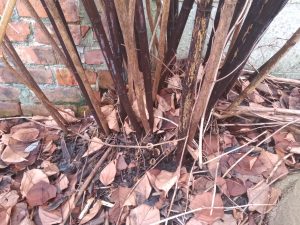
How do I know if I have knotweed?
If you think you have identified Japanese knotweed on your property, it is crucial to act quickly. The plant can cause structural damage to buildings and is notoriously difficult to eradicate. The process often requires professional assistance.
Keep in mind that several plants have similar appearances to Japanese knotweed, such as bindweed or bamboo. A professional surveyor or a local extension service can help you make a definitive identification.
Please note that it is a legal obligation in some authorities not to allow Japanese knotweed to spread from your property. There may also be laws regarding the disposal of Japanese knotweed waste, due to the plant’s ability to regenerate from small fragments. Always check with local regulations and seek professional advice if you are dealing with Japanese knotweed.
If you have identified Japanese knotweed on your property, it’s understandable to be concerned. Here’s why:
- Damage to Property: Japanese knotweed is known for its strong, fast growth and can cause damage to building structures and foundations, as well as infrastructure such as drains and driveways. The roots can penetrate deep into the ground and exploit cracks and weaknesses in structures.
- Financial Implications: The presence of knotweed can potentially reduce a property’s value and make it more difficult to sell, especially if the infestation is severe. In some cases, lenders may refuse mortgages on properties with a Japanese knotweed problem until it’s dealt with professionally.
- Legal Obligations: In some countries, you’re legally obligated to prevent Japanese knotweed from spreading to neighboring properties. If you do not manage the plant and it spreads, you could potentially face legal action.
- Environmental Impact: Japanese knotweed can outcompete native vegetation and cause biodiversity loss.
While these points might sound alarming, remember that Japanese knotweed is a manageable problem when tackled appropriately:
- Seek professional advice as soon as possible. Experts can create a management plan to control and eventually eradicate the plant.
- The process can be lengthy, often taking several years of treatment due to the plant’s resilient nature and the depth and spread of its root system.
- Keep a record of actions taken to deal with the knotweed. This could be useful if you ever decide to sell your property.
So while you should take Japanese knotweed seriously, there’s no need for undue worry. With the right advice and treatment, it can be brought under control.
